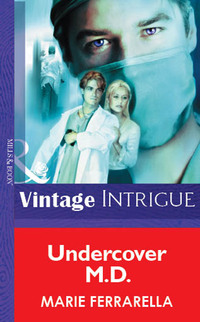
Полная версия
Coming Home For Christmas
When she was finished, Kenzie made her way downstairs quietly. She was just in time to hear the person—an older woman—who had rung the doorbell tell Keith, “I could drive you over to the funeral home if you’d like.”
Keith guided the woman in his mother’s foyer toward the door. He’d been polite, letting her elaborate on how she felt when she’d let herself into the house and found his mother unconscious on the floor, but he didn’t know how much longer he could maintain his facade. He didn’t want details. Details would only reel him in, and he wanted to remain distant.
It was time to send the woman on her way.
“No, I know where it is. Thanks, anyway, Mrs. Anderson.”
Peggy Anderson lingered in the doorway. “It’s just not going to be the same without your mother living next door to me,” she told him sadly. “Your mother had a way of lighting up everyone’s life the second she came in contact with them.”
“So I’ve heard,” Keith replied, an extremely tight, polite smile underscoring the words.
Observing him, Kenzie could see that he was holding himself in check. Keith was probably afraid that if he allowed his guard to go down, he’d fall apart.
Sympathy flooded through her.
It intensified as she drew closer.
Ushering Mrs. Anderson out of the house, Keith closed the door firmly behind the talkative woman. He stood there for a moment, looking at the closed door, his entire body a testimony to rigidly controlled grief.
Or so it seemed to Kenzie.
There were men who wanted only to be left alone when they were dealing with their darkest hour. However, she had never learned how to accommodate them, because everything within her cried out to offer a grieving person as much comfort as she could render.
And besides, this was Keith. There was no way she could stand on ceremony.
Coming up behind him, she placed her hand on his rigid shoulder, trying to convey her availability to comfort him in his grief. She said with a great deal of sincerity, “I’m so sorry.”
Keith almost jumped when he felt her hand on his shoulder. He’d forgotten all about her. How long had she been standing there? She was supposed to be upstairs, taking inventory, not down here, eavesdropping.
He swung around to look at her. “You can’t sell any of it?” Keith asked, assuming that her apology referred to the things she’d found in the upstairs bedrooms.
“What?” It took Kenzie a minute to untangle his reaction. And then she understood. They were talking about two entirely different things.
“Oh, no, I’m not apologizing about anything that has to do with your estate. I just wanted to tell you how very sorry I am about your loss.” And then Kenzie frowned, shaking her head. “The words are trite,” she was quick to admit, “but that doesn’t make the sentiment any less genuine.”
“I’m sure it is,” he said crisply, cutting the young woman off in case she had more to say on the subject.
This whole thing was much too private, and he didn’t want to talk about it. However, he could see that she felt she had to say something. He shrugged away any obligation she might have thought she had in this case.
“Everyone’s got to die sometime, right?” He needed to get out—and he actually did have somewhere else to be. “I have to leave for a while. Go on with your tour. Let me know if you think you can sell these things and what they might go for.”
“Absolutely,” she promised, then asked, “Where are you going?”
He wasn’t prepared to be questioned, so he didn’t have a lie on tap. Which was how the simple truth wound up coming out. “I’ve got to go see about making funeral arrangements.”
Now there was something she’d find oppressive if she had to face it on her own. “Are you going alone?”
Again, she’d caught him off guard. And there was that weird feeling again, as if he knew her from somewhere. But that wasn’t possible, was it?
Either way, Keith thought that was an odd question for her to be asking him. “Yes. Why do you ask?”
“I just thought you might want some company. You know, someone to talk to. This isn’t exactly a run-of-the-mill errand you’re about to undertake,” she pointed out.
He turned the tables on her by saying, “If you need to talk to me, we can meet later.”
With that, and a mumbled “See you later,” he walked out before Kenzie had a chance to say that she thought he was the one who needed to talk, not her.
Instead of going back to her work—she had yet to inventory the first floor—Kenzie went to the front window, moved aside the curtain and stood in silence as Keith walked down the driveway to his car.
Here was someone who was either oblivious to, or more likely in denial about, the extent of his own grief.
Watching him, Kenzie made up her mind.
* * *
There were too many damn questions to answer, Keith thought wearily half an hour later.
Mrs. Anderson had told him that, per his mother’s wishes, upon her death, Dorothy O’Connell wanted to be laid out at Morrison & Sons Funeral Home. He’d assumed from this information that all the paperwork had been taken care of.
He’d assumed wrong.
He supposed he could have just taken the easy way out, called the funeral director to ask about the costs and then assured the man that the check would be in the next day’s mail. To be honest, Keith still wasn’t entirely sure what he was doing here. It all seemed rather perverse and against what he’d always felt his role would be after his mother’s final breath had been taken.
This process wasn’t supposed to matter to him, but it did.
He supposed that somewhere—very deep inside—was still a sliver of the kid he had once been. The kid who had gotten along with his mother and had wanted nothing more than to take care of her and his sister. He’d wanted to be the man of the family.
He must have been all of ten or eleven years old at the time.
Before the age of reason, Keith silently added.
“I can write up a full accounting,” Abe Morrison Sr. was telling him.
The funeral director looked exactly the way Keith would have expected the man to look. Tall, thin, somber, with a touch of gray at his temples and a soft voice, as if he knew that speaking above a certain decibel level would be intruding on the next-of-kin’s grief.
But Keith was hardly listening to the man. He just wanted this part of it to be over with.
Hell, he wanted all of it to be over with.
More than anything, he wanted to be on a plane flying back to San Francisco and his life, his future, not sitting here with a stately old man, stuck in the past as he listened to him talk about a woman who was in essence a stranger to Keith and had been so for close to ten years.
Abe Morrison, however, seemed to know her very well. Why the thought irritated him so much, Keith wasn’t sure, but it did and that contributed to his feelings of intense restlessness.
The man’s whisper-soft voice was beginning to annoy him, as well.
“She was very explicit, your mother,” Abe was saying. “She didn’t want to burden you with a lot of details.” A mass of wrinkles around his eyes became prominent as the funeral director offered him what appeared to be a fond smile. “Not all our clients are as thoughtful as your mother was.”
Keith nodded dismissively. He didn’t want to be here in this place where the dead were made to look lifelike. He took out his checkbook, hoping that would signal an end to Morrison’s narrative.
Placing his checkbook on the edge of the man’s mahogany desk, his pen poised, Keith asked, “So, what do I owe you?”
“Nothing,” Abe replied serenely.
Keith looked up at the man. Was this some sort of a game? If it was, the point of it was lost on him. “Nothing?” he questioned.
“Nothing,” Abe repeated, then went on to explain. “Your mother wrote out a check once she’d decided what she wanted. Always knew her own mind, that lady,” Abe commented with just a hint of an appreciative laugh. “She prepaid her funeral expenses. She just wanted you to fill in the paperwork.”
He should have known. She’d become almost flighty in that year after Amy’s death, but at bottom, she was an exceedingly proud, responsible person who always insisted on paying her own way. He supposed funeral expenses were no different for her. Making him fill out the paperwork was just her way of reminding him that she was still in charge, even though she was no longer around.
Closing the checkbook again, he slipped it into his jacket’s inside breast pocket. “So I guess if there’s nothing further you require from me, I can be on my way.”
Abe’s finely curved eyebrows drew together as his brow furrowed. He gazed at Keith as if he couldn’t comprehend what had just been said.
“Don’t you want to view the body?” he asked, seemingly convinced that Keith hadn’t really meant he wanted to leave without seeing his mother. “Our in-house cosmetic artist did an excellent job,” he added quickly. “In case you think seeing her this way might be too difficult for you, I assure you that your mother just looks like she’s sleeping.” The lanky funeral director was already on his feet, ready to lead the way into Dorothy O’Connell’s viewing room. “Come, I’ll take you to the room myself. You’ll be the first one to see her—other than my staff, of course.”
Keith wanted to tell the man there was no need to bring him to his mother’s viewing room. He wanted simply to beg off and leave. After all, he hadn’t spent any time with his mother in the last ten years of her life. Why would he want to spend any time with her now that she was dead?
But he had a very strong feeling that if he left, the funeral director would only keep after him until the man got him to change his mind—or lose his temper. He might as well spare himself the aggravation. And this way, after he got this viewing over with, he’d be done with it once and for all.
So, against his better judgment, Keith allowed himself to be led into the viewing room.
He was prepared to mumble a few token words of grief for Abe Morrison’s benefit and then leave the funeral home and this part of his past once and for all.
What Keith wasn’t prepared for was that the funeral director would leave him alone in the viewing room.
And he definitely wasn’t prepared for the impact that being alone with his mother’s body would have on him. Logically, he knew it wasn’t her. It was just the empty shell of what had once been his mother.
And yet...
She still seemed to be right there, a part of everything. A part of him.
Keith felt as if someone had stolen the breath out of his lungs, then sat on his chest, daring him to suck air back in.
He couldn’t.
For just a second, before he regained control over himself, Keith thought he was going to black out.
“Guess you got in the last word, after all, didn’t you?” he asked his mother, the question barely above a whisper.
Keith felt tears gathering in the corners of his eyes, and he damned himself for it and her for making him have to go through this.
“This doesn’t change anything, you know,” he told her gruffly. “This death thing isn’t going to soften me and make me decide you were right and I was wrong. I wasn’t wrong. You were. Wrong to act like life was one great big party, wrong to act like you were a teenager, living life to the fullest—and more.
“I know what you were trying to do,” he told the still form lying in the blue silk–lined casket. “You were trying to live Amy’s life for her after she couldn’t live it herself. But you couldn’t do that,” he pointed out, the very words he uttered scraping against the inside of his throat. “Nobody gets to live someone else’s life. Everybody’s got one chance to live, and if that’s taken away, well, then it’s gone.”
He leaned over the casket just a tad, bringing his face in closer to hers. Damn it, the funeral director was right. She did look as if she were sleeping.
He felt as if Death—and his mother—were rubbing his nose in the fact that she was gone.
“There are no do-overs, even if you thought there should be. You don’t get to decide things like that,” he informed her. And then his voice grew louder as his anger came to the fore. “Don’t you think it tore me apart, seeing you do that? Acting like Amy when Amy wasn’t there anymore? You were her mother—my mother. You were supposed to act like one, not like some teenage girl with a mission.
“And where did all that get you in the end?” he demanded heatedly. “Nowhere, dead on a slab, that’s where it got you.” Because now that he thought about it, his mother’s erratic, age-denying lifestyle must have contributed to her demise. “Now your life’s gone, too, just like Amy’s.”
The disgust abated from his voice, and it softened again just a hint. “Maybe you could have lived longer if you hadn’t lived so crazy. I don’t know, and it’s too late to find out.” He turned to leave, then stopped, another wave of recrimination hovering on his lips. “But you shouldn’t have done it. You shouldn’t have,” he repeated, stopping short of raising his voice to the level of shouting.
He didn’t want to attract anyone to the room. Having a meltdown here in the middle of the funeral home was bad enough without it being witnessed by a bunch of strangers.
Still, Keith stood there in the room for a few more moments, doing his best to pull himself together. Searching for a way to reconcile the fact that he was never going to see his mother’s face again. This was to be the last time he’d see her, and he told himself that he shouldn’t care.
But he did.
Calling himself a fool, Keith squared his shoulders and turned to walk out of the small viewing room. He didn’t have time for this, didn’t have time to let something as useless as grief eat away at him. He had loose ends to tie up and a busy life to get back to. He wouldn’t stand around and mope over a woman who had had no regard for him whatsoever, who had shut him out when he’d tried to reach her and make her accept reality.
This, he thought, taking one last look at Dorothy O’Connell, was the final reality.
Turning, he took a long stride out of the room—and walked straight into the young woman he couldn’t quite place, who was standing just outside the room.
And who was apparently, if the expression on her face and the tears glistening in her eyes were any indication, listening to every word he’d just said to his late mother.
Chapter Four
It was a toss up whether he was more surprised or angry to find her there.
“Please tell me you’ve found a buyer for all those things in the house. Either that, or you suddenly need a funeral home, because otherwise, you have absolutely no reason to be here right now, hovering outside my mother’s viewing room,” he informed her.
He wasn’t all that sure he could tolerate the truth, but he wasn’t about to put up with any kind of lie.
“You’re my reason,” she told him, her voice as quiet as his was sharp.
Stalker.
The word flashed through his head in big, bold letters. Was that what he’d done, hired a stalker? The possibility made him angrier.
The scowl on his face was meant to be intimidating. “You’re going to have to explain that. Carefully,” he warned.
His eyes held her prisoner, as if to say that he could see right through her and would immediately know if she was lying to him.
Because he seemed so angry, Kenzie deliberately curbed her habit of speaking quickly. Instead, she enunciated every word that she uttered so he could absorb it.
“You were coming here alone, and this isn’t the sort of thing a person should have to face alone,” she told Keith with feeling. “I thought you might need a friend, so I came.”
Keith stared at her. “You’re not my friend. We have a working relationship,” he reminded her tersely, then added, “I don’t make friends that easily.”
That she could readily believe, despite how popular he’d once been. Still, even though he had apparently changed, that didn’t alter the way she felt about what he was going through or what had initially compelled her to come to the funeral home, looking for him.
Given what she’d heard him say when he thought no one was listening, she knew better than most what he was going through.
Kenzie approached the subject slowly. “I had an argument with my father.”
Keith’s scowl deepened. “I’m not your priest, either, which means I don’t do confessions.” And then his curiosity about what she was thinking got the better of him. “What does your argument with your father have to do with me?” he demanded.
Kenzie pretended that he hadn’t asked any impatient questions. Instead, she went on as if the man she addressed was quietly waiting to be enlightened.
“My father definitely had opinions about my lifestyle, my choice of friends. You know, all the usual reasons fathers and daughters butt heads. I put up with it for a while, then decided that if that was how he felt, it was his loss, not mine, and I stopped talking to him. I refused to return his calls and, to make a long story short—”
“Too late,” Keith informed her tersely.
He was making it difficult for her to get her point across, but she pushed on. “I smugly put him in his place—or so I thought.” Her voice became more serious as she continued. “I also thought there was all the time in the world to resolve these differences between us when I was good and ready to.”
Kenzie took a breath. She and her father had had more than their share of differences, but she’d loved him, and it still hurt to think about him no longer being part of her life.
“My father died before that happened. To this day, I really regret not mending those fences. And I regret not getting off my high horse and just declaring those differences we had to be meaningless water under the bridge.” She looked up into Keith’s eyes. “So I know firsthand what it’s like to have someone die on you before you have a chance to make up.”
“I had no intentions of making up,” he informed Kenzie.
Kenzie shook her head. “You say that now, but you don’t really mean it.”
“Look—”
Kenzie wasn’t about to back down from her position. She was certain that she was right and he was in a state of stubborn denial.
“No one but the Tasmanian Devil wants to live in a state of perpetual warfare.” She looked past Keith’s shoulder toward the casket. “I’d like to pay my last respects to your mother.”
That really didn’t make any sense to him. “Why would you possibly want to look at the earthly remains of Dorothy O’Connell?”
Moving into the room, Kenzie gazed down at the woman and then at Keith before turning back to the deceased again. “I’m looking at more than that.”
“An estate sale with a side order of philosophy,” Keith said sarcastically. “Does that come as a package deal, or am I required to pay extra for it?”
“You know,” she said in a tone that was devoid of judgment and composed solely of concern, “you might do a lot better getting along with yourself if you just dropped the attitude—and the ‘philosophy,’ as you call it, is free. As for our business arrangement, I only get a percentage of the total sales once they’re final,” she pointed out. “That’s written in the contract I brought with me,” she told him before he had a chance to ask about it.
Circumventing him, Kenzie went straight to the casket for a closer look at his mother. “She was always a pretty lady,” she observed softly. Her mouth curved a little as she added, “She looks so young.”
He shrugged, telling himself he didn’t care about his mother, about any of it. “That was her goal.”
His retort was cynical. Kenzie raised her eyes to his. When had his soul become so tortured? she couldn’t help thinking.
“Everyone deals with grief in their own way.” Her comment had him eyeing her quizzically. “I heard you talking to her,” she told him, thinking it was best not to elaborate any further right now.
“Of course you did,” he responded. She could tell he struggled to curb his annoyance.
She watched his expression as she said, “I was just trying to help.”
“You want to help?” he retorted. “Don’t eavesdrop. Don’t follow me. Just sell the damn things in the house. That’s all I need or want from you.”
He needed more than that, Kenzie couldn’t help thinking, even if he didn’t consciously realize it. But for now, she pretended to go along with his instructions and nodded her head.
“I still have to go over some of the inventory with you.”
He’d hired her at the agent’s suggestion so he wouldn’t have to deal with any of that. Now she seemed determined to pull him in to do exactly what he didn’t want to do.
“Why?”
“So I can put a proper price on the items,” she replied innocently. She had more of a motive than that—she wanted to help him deal with his feelings and the past—but saying so would only accomplish the exact opposite.
“Isn’t that up to you?” he asked. “You’re supposed to be the one with the expertise in vintage clutter.”
He was hiding behind insults, but she had an idea that wasn’t how he felt about it, not really, not deep down.
“I’d need you to point out the items that have more sentimental value for you—”
Keith immediately cut her short. “Well, that’s easy enough. There aren’t any.”
The house was filled with clothes, photographs and other things. It seemed impossible to her that he didn’t have at least a few favorite items amid the rest.
“None?” she asked.
His answer was firm. “None.”
Kenzie studied him for a long moment. “I don’t believe you.”
“Believe me or not. I really don’t care what you believe. All I want from you is to deal with the facts as they exist.”
When it came to battles, Kenzie had learned that picking the time and place gave her some advantage. For now she acquiesced. “If you say so.”
His eyes narrowed. “I say so.”
His voice was firm, but Keith didn’t believe what she’d just said for an instant. This woman didn’t strike him as the type to withdraw suddenly like that. Even after only a couple of hours, she seemed a bit more of a fighter than that. If he were to put a bet on it, he’d say the woman was a great example of sneak attacks and most likely was the human personification of guerrilla warfare.
Kenzie pressed on in her own fashion. “I’d still take it as a favor if you would give me some sort of a bottom-line price on some of the things I found in your mother’s closet.”
Keith grunted something unintelligible in response as they left the funeral home. He had no desire to go through the things in his mother’s closet.
Kenzie turned toward him once they were outside in the parking lot and asked, completely out of the blue, “When’s the funeral?”
There was nothing boring about this woman, Keith thought. “In three days. My mother, according to Mrs. Anderson and confirmed by the funeral director, left very specific instructions as to what she wanted. She thought three days would give all her friends enough time to say goodbye.” He was reiterating what the director had told him.
It was obvious to Kenzie that he did not appreciate the time frame. Stepping over to the side, she tried to put what he seemed to view as an ordeal in a more flattering light.
“That was very thoughtful of her.”
He, apparently, didn’t see it that way.
“Or vain,” Keith countered. “Think what it says for her to believe she has enough friends that they would fill up three days of a calendar. I don’t know of anyone short of a Hollywood celebrity who could have that sort of a following.”
What had made him so bitter? Kenzie wondered. There had to be something else at work here, not just an estrangement between a mother and her son. Had Amy’s death been the trigger?
“Oh, I don’t know,” she told him. “I’d like to think that people who touch other people’s lives on a regular basis might get that kind of a send-off when their time comes. Your mother obviously meant a lot to many people.”














